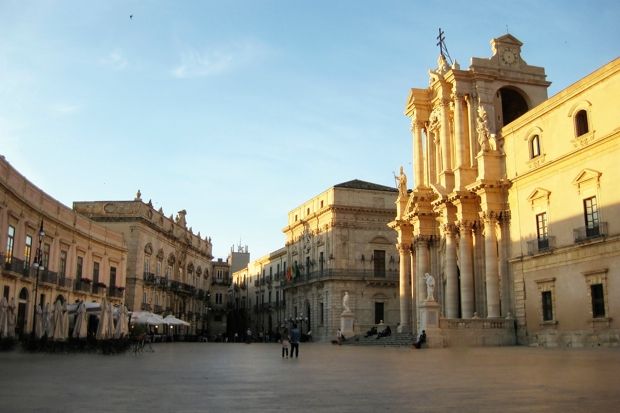Syracuse is a handsome place, steeped in a rich historical broth. At the tip sits Ortygia, an island offshoot, which has been the backdrop to many Mediterranean sagas: Hellenic, Christian, Medieval, Renaissance, Baroque — take your pick. By day, Via de Benedictis is filled with local men selling sea urchins, milky balls of ricotta and bunches of mint. At night, we went to the Piazza Duoma for aperitifs. The cathedral’s broken pediments and exuberant sculpture cast strange shadows on to the square and a zephyr blew. It was November and the place was empty, aside from a small boy on rollerskates and a dog. In summer it must swarm with people.
An earthquake destroyed much of southern and eastern Sicily in 1693, and many of the towns were rebuilt in a Baroque style. You can reach them all by car; goodness knows how you’d see them without one. I’d always thought driving holidays were deeply uncool — at the same end of the spectrum as cruises and rambling. But what a joy it turned out to be to whizz along a clear, Mafia-funded motorway! I can see why people get into it.
The southern towns of Noto, Ragusa and Modica were all rebuilt with much vigour. They are packed full of 17th-century treats — golden-stone churches set among the palm trees, extravagant marble concoctions, paintings by Caravaggio. ‘Look at us, Rome,’ they say. Another seismic shock might smash it all again one day. Would today’s architects rebuild with such opulence? I doubt it.
Modica is famous for its granular chocolate. Tucked just off the town’s main road is Antica Dolceria Bonajuto, which has been selling bars of it since 1880. The waxed paper packaging hasn’t changed since that time and is delightful, as is the town’s hot chocolate, which is so thick that a spoon can stand up in it.









Comments
Join the debate for just £1 a month
Be part of the conversation with other Spectator readers by getting your first three months for £3.
UNLOCK ACCESS Just £1 a monthAlready a subscriber? Log in